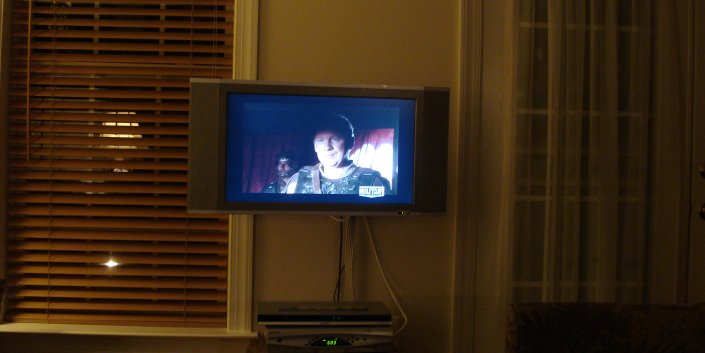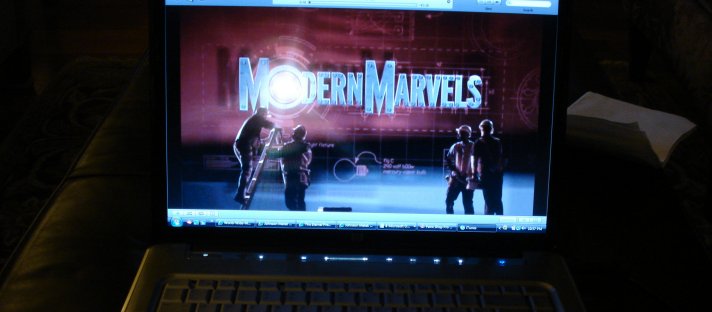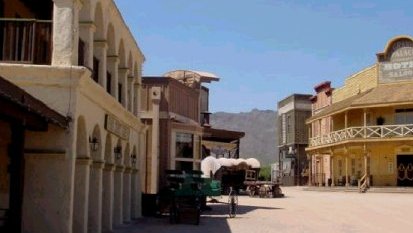t was cold outside today so I spent the day productively watching TV. Of course, I grazed and in true omnivore fashion I didn’t stick with any one program for more than a few minutes and I took advantage TVio to time shift. It used to be that movies, televisions shows, plays, even books and music had their time and then fell into the memory hole. Some like Gilligan’s Island or Star Trek became ubiquitous in reruns, but most emerged rarely. Today everything is available in a vast chaotic mélange that defies time and genre, language and space. Too much choice dulls the senses, but who would want to let somebody else decide what to limit?

On the cerebral side, there are a lot of good programs on history and science. It has become a true marketplace of ideas, but there is significant chicanery and manipulation. A picture is worth a thousand words and a reenactment can do even better than that. The producer has the power to manipulate interpretations. Propagandists have known this ever since movies were invented and even before. Many theatrical productions were clearly meant to highlight versions of the past that supported the power of the present. Shakespeare’s history plays are prime examples. George Orwell famously warned that “He who controls the present, controls the past. He who controls the past, controls the future.”
I don’t think that there is a conscious attempt at propaganda in the historical productions on cable TV, but they do exacerbate the historian’s tendency to attribute too much to conscious choices and plans. A half hour program contains fewer words than a short pamphlet. It must compress characters and events. It must also make sense and a story out of disordered events. Sometimes it is not a matter of conflicting plans but simply somebody forgot, didn’t know or didn’t care. The story we tell is usually more logical than the reality. The reality is that shit happens and sometimes there is no good explanation.
If you don’t find it on TV, you can always look on I tunes.

I don’t think that TV producers are (usually) trying to propagandize at least when you get more than a couple of decades before the present, but they do have proclivities that create a systematic bias. Producers like action, so there is a bias toward agency. They also like underdogs and rebels, so they tend to overemphasize pirates, bandits and small groups of dissidents. I have seen at least three separate documentary dramas on the Briton’s warrior queen Boudicca, for example. The British forces killed a lot of Roman civilians and did manage to ambush a Roman army, but the Romans cut them to pieces once they became fully aware of the situation and there was never any question of the final outcome. For the Romans it was just a local affair in a faraway place.
In the study of history it is always useful to see who is still standing at the end. It is easy to exaggerate power, numbers and importance in descriptions, but if at the end of the day one gives up and the other doesn’t, you can be pretty sure who really prevailed.
Producers also suffer from a bias toward new and tenuous explanations. Both the scientific and the historical methods require hypotheses to be tested with evidence. Lots of hypotheses are not supported by the evidence and these tend to be the most interesting ones precisely because they are new and often weird. They also have the advantage of being perceived as insider or hidden information. I think that was one of the attractions of the “Da Vinci Code,” which didn’t actually purport to be anything but fiction, but was taken as factual by the credulous. I have seen a few of the documentaries on that subject. The same was true for myths like the Bermuda Triangle and Chariots of the Gods from my youth.
Below – picture from Old Tucson where they filmed many westerns. We visited in 2003, so this is an archival photo. The entry from that time is at this link.

Returning to my original subject of what’s on TV, there were lots of interesting things on. I used the remote a lot, so I watched none of these full time or to the end. It is a sort of TV multitasking. Sometimes you don’t have to watch the whole thing. There were some episodes of Iraq Diary on the Military Channel. It brought back some memories, good and bad. They talked about the heat and the dust and getting dusted by the helicopters. I remember. One of my favorite programs is “Modern Marvels”. I had a saved episode re superhighways. I watched the History Channel on the Spartans, the Battle for Rome and one about our Civil War. I got a few snippets of “The Longest Day” and “Highlander.” I don’t remember which channel they were on. “South Park” was funny. It was about the Goths. The eWest channel had John Wayne movies all day and I watched the end of “The Man from Utah” made in 1934. The interesting thing about old movies is that they were made with real sets and actors, not computer enhancement. I also watched part of “Rooster Cogburn,” the John Wayne movie made forty years after “The Man From Utah.” In between was “The Horse Soldiers.” I didn’t have to watch that, since I still recall it well. It was not a very good movie anyway. I still like to watch “Bonanza” Sundays on TVLand. It is not so much that I like the show itself anymore, but it gives me a kind of peaceful, easy, nostalgic feeling. Little Joe, Ben, Adam & Hoss seem like old friends when they ride up with Lake Tahoe in the background. Bonanza was on Sunday nights when I was growing up.
I remember the Cartwrights were on the night when the Beetles premiered on the Ed Sullivan Show. We were at a party at my Aunt Florence’s house. My cousins Mary and Barbie were very enthusiastic about watching the Beatles. I would have preferred to watch “the Scarecrow” on the Wonderful World of Disney, but I was outvoted. Just as well; the Beatles were historical. Funny how memory works. That was almost forty-five ago and I was only eight years old. I don’t remember what songs the Beatles sang. I wasn’t paying attention.
